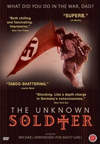The Unknown Soldier
For the past 30 years, the picture of the Holocaust had been pretty much defined in a rather static manner. Hitler's SS and the Gestapo were held responsible for the extermination of the Jews and millions of war prisoners in Europe during the Third Reich, and that was that. It was a clear cut bad guy image that held up pretty well to general scrutiny.
In 1997 that perspective changed a bit when an exhibition in Munich was opened, displaying a large number of photographs and documents, combined with first-hand accounts and historic research that indicated that the situation was not nearly as clear-cut as everyone would have us believe. The exhibition suggested that the German Wehrmacht – the army – actually played a big part in the genocide and countless war crimes, instantly creating an outcry among the German population as to the legitimacy of these claims.
As many of you may know, I am German by heritage and lived in Germany for most of my life. As such this documentary was extremely interesting for me, just to see this historical research that happened after I had left the country. Covering the exhibition as well as its fallout, the documentary tries to give both sides of the discussion exposure to allow the viewers to make up their own minds on the subject matter. And while no documentary can ever be entirely objective, I did get the sense that this one at least tries to inform and explain why certain attitudes prevail.
I want to be honest with you. After seeing the documentary I do believe that the Wehrmacht had its hands in the events and that many soldiers cannot simply wash their hands in "I saw nothing" excuses any longer. Of course, many of them never saw a thing, never knew a thing, never even got in touch with the "problem" for a vast number of reasons. But those who did most likely covered up their doings in a veil of lies to protect themselves. If so many of the men returning form the war did not want to talk about their experiences on the eastern front I am now convinced that it was likely not because of the atrocities they witnessed but of the atrocities they committed. As the exhibition also unearthed, all this time there were nonetheless countless artifacts pointing to that conclusion hidden in family photo albums and file folders. Putting these photos and documents on public display suddenly made many people realize that many of these war stories as we knew them were more wishful thinking than truth.
Fortunately the documentary or the exhibition does not only make these accusation lightly and more importantly it tires not to generalize things. While opponents of the effort constantly try to discredit the exhibition and the latest historic research in that direction judging from what I've seen, there has to be some truth to it. But it is important to understand that there are no generalizations. No one will ever say the entire Wehrmacht committed these war crimes. Not every soldier in the army was murderer – but sadly some were, maybe many, whether we like it or not. Of course it is not easy to face this kind of new view on things and many people simply cannot accept the fact that their fathers or grandfathers could possible have been the ones committing these crimes, but someone did. Despite all the denial, the prisoners of war did not shoot themselves by the millions on their march from Russia to Germany. The Jews did not shoot themselves either and buried themselves in mass graves. Most of these victims were under the care of the Wehrmacht at the time and they were decimated in a matter of weeks.
Clearly this is a topic for much debate and heated discussions. Personal feeling flare up easily and it is hard for anyone even remotely affected to remain unbiased. The documentary tries to show that very nicely giving each side ample voice, but it has to be said that the historic research is so much more coherent and convincing than people insisting that their grandfathers were heroes or the skinhead Neo-Nazis' incoherent blathering.
I believe the most important question the exhibition and the documentary ask is, "How could this have happened?" And fortunately it offers a number of answers to the questions. Answers that do make sense. Answers we can relate to because we can see them in our everyday lives. The answer is the same as the one to the question why we have so much gang violence in the US, why our media are filled with murder, death and kill stories ad nauseam. There is no real rationale behind it that people with common sense can grasp and yet it permeates our society. Though not very surprising, I found these answers incredibly enlightening as they confirmed many of y previous thoughts and suspicions. The frightening thing about them is that they make it clear that the events of the Third Reich could repeat themselves easily at any time almost anywhere in the world. In fact, many of the political developments and civil wars of recent years are not all too unrelated from the seed that germinated the hatred and contempt necessary to allow for massacres like the Holocaust to happen.
"The Unknown Soldier" is an important documentation of the events surrounding this new perspective on the Holocaust. While it is emotional, of course, it is never sappy and it inspires to think about what happened and the complexities of the issue. I am certainly glad I watched this film. It has opened my eyes to a new perspective on the history of my native country that I never dared possible – and yet it is. It has simply become implausible for me to try deny and argue away the scope of the Holocaust and those involved, painful as it may be.







